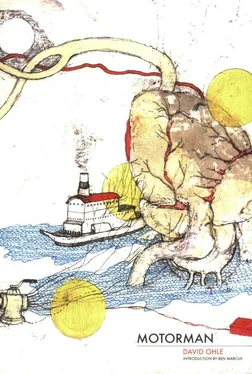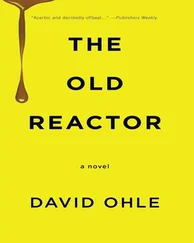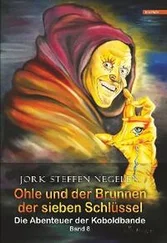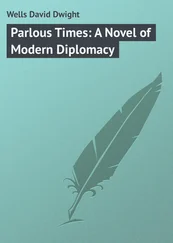He walked a klick or so into the bottoms and stopped. He would have breakfast. Prune wafers and a cricket or two. He would pull together a mound of leaves and tree bark and cypress knots, build himself a fire, warm his feet.
Had Burnheart said to travel by night and sleep by day, or the other way around, or not at all? His hand hurt badly. He couldn't remember what Burnheart had said about traveling.
He ate a prune wafer. It gummed in his teeth.
The fire smoldered flamelessly.
He would travel whenever he could, whatever Burnheart had said, if anything. Whenever the opportunity for movement presented itself, Moldenke would move.
No artificial barriers at this juncture. Always to the right, always to follow the natural impulse. The hum and the flow. Everything was tight.
He lay back against a cypress knee, watched the second rising sun overtake the first. In the city k-buses would be taking jellyheads to work, shifts would be changing, the street music would be deafening.
He ate a cricket, spitting the legs into the smoking leaves, took off his coat. The double suns said ten o'clock, although Moldenke read them as eight. He put on his goggles and the refraction corrected his error. It was later than he thought and getting hot. He took off his coat, stirred the fire. A rooster comb of flame burned a moment and died.
Perspiration broke around the goggles and soaked the gauze pad. He tied on a dry one, ate another cricket, dropped his trenchpants, squeezed several turds onto the fire, pissed away the last of the smoke.
He walked south, chewing a stonepick, wondering if he would clash with Eagleman. With the tip of his tongue he rolled the stonepick across his bottom lip.
He reached into a low swirl of ether branches and took down a snipe. He pinched its neck and dropped it into his sidepack. He would have it for supper. It had been weak, hadn't attempted to fly away. "Nothing here but food," he said. "Burnheart was right."
Had Burnheart mentioned liquids? He would wait. Somehow there would be water, a trickle from the rocks, if there were rocks.
He would smoke a cigar as he walked. He focused sunslight through a lens of his goggles, held the hot beam at the tip of his cigar until a spark caught and circled. He puffed, put the goggles on again.
36
Eagleman's moon, the first moon, had been a shadow game, a projection of zero on a screen of gas. A mock month before it went up Moldenke learned of it in a letter from Burnheart:
Dear Moonless,
You will soon have a reason to take a look at the night sky again. Eagleman has a moon on the drafting table. The concept of it is difficult even for me to grasp, the way he explains it. Actually, what it amounts to is not much more than a photograph, a slide picture of the old original moon projected against the gassier layers. And he's provided for changing your slides for the various phases and so on. A very efficient, quite portable moon, Moldenke. The man is a repository of mechanical wisdom, a swarm of intelligent thoughts in his head. Some day we'll all look to Eagleman to get us through. Mind what I say. And keep your eye on the sky.
Hopefully yours,
Burnheart
37
He found himself standing at the foot, one of four such feet, at the base of the legs of a weather tower. The wind picked up, the weather was changing. He shaded his eye and looked up to the top of the tower. There was a windsock, windfilled, a weathercock spinning, and a brace of antennae. He turned up his collar, snorted, blinked his eye. One sun went down behind the tower.
A bank of brown clouds erased the other sun and forced an early night. Too bad, Moldenke thought, and it isn't quite noons yet. The jellyheads had learned to sleep at will, could doze whenever an unexpected night came on. Moldenke couldn't.
He strapped himself in the lift chair and pressed the buzzer. A voice came down the slot: "Good morning and good night, Moldenke. I saw you coming. Fill up your lung and I'll bring you up. Try to hold the stomach in so we won't spill any food. Have you tied the footstraps?"
Moldenke said, "You know me?" The voice in the talk tube had sounded familiar, but Moldenke couldn't place it with a body, or a face, or a name.
"I knew your name and I knew you were in the area. How many walkers do you ever see in these parts? Who ever crosses the bottoms these days? How many people do I see wearing a trenchcoat, trenchpants, carrying a sidepack and a backpack and wearing purple-view goggles? Who else could it be but you, Moldenke? I said I knew you were coming. I didn't say I knew you socially. My name is Shelp. How do you do? I'm the weatherman."
Moldenke remembered the radio voice, the weather reports.
"You're Shelp? The weatherman?"
"Didn't I say that? I remember saying that."
"Yes. Glad to know you. Call me Moldenke."
"Shall I send the lift chair up, Moldenke?"
"Shelp?"
"Yes?"
"You said to fill my lung. You used the singular. You know me fairly well, don't you?"
"Not at all, Moldenke. I only know a few of your anomalies. I'll bring you up now. Have you got the crotch buckle tightened?"
"Yes, I'm ready."
"Breathe in."
Circuits opened and closed in a box on the arm of the lift chair and he went up. At the deck he unstrapped himself, cricket and prune knotting in his stomach. The ride up had loosened his shoes. He knelt and re-buttoned them.
Shelp took his elbow and showed him into the weather room. A wood fire burned in a floor pit. Moldenke sat in a chair. Shelp threw genuine oak on the fire.
Shelp pointed at the floor pit: "This is where I cook my cat weenies, and sometimes I'll put a naked toe in the coals to clean out my head. You know the old expression?"
"Yes," Moldenke said. "Out of mind, out of sight. . Oh, pain, the soap of thought. . and so on. I've heard them."
Shelp said, "How do you feel, Moldenke?"
Moldenke said, "Odd and a little rattled, but comfortable, exactly the way I should feel. Shouldn't I?"
Shelp said, "You should. Why shouldn't you?"
Moldenke said, "I shouldn't. I don't know you."
"You may be dizzy, Moldenke. I may have brought you up too fast. Hold out your tongue."
Moldenke held out his tongue. Shelp placed a green spansule on it. "There, that will bring you down." He poured a cup of cherry water. Moldenke washed down the spansule.
The fire whistled.
Shelp said, "Concentrate on the fire, Moldenke. Regard the flame as a reflection of itself. Think of it as hot and cold as well. Play the game. You must have noticed that certain flames do not reflect in certain mirrors. Have you? Moldenke? Are you down yet?"
The teaboil whistled.
"Are you down, Dink?"
"I think so."
"I'll prod the teaboil. We'll have some tea."
Shelp opened a cabinet. "Your choice, Dink: mothwing, ginger root, banana flower — what?"
"Banana flower." Moldenke crossed his legs and loosened his backpack. "I used to be a banana man at the Trop Garden."
"I know," Shelp said.
"Of course," Moldenke said. "Mind if I smoke?" He lit a cigar.
Shelp said, "No," that he didn't mind. "I'll have one myself." He lit a brown cigar.
Moldenke said he hadn't seen a brown cigar since before the mock War. Shelp agreed they were rare.
They drank tea and smoked.
Shelp said, "I work for Bunce." Moldenke threw his tea in the fire and stood up.
"You work for Bunce?"
"Be easy, Moldenke. Sit down. You're safe here."
"You said you worked for Bunce."
"I didn't mean to excite you. I know it's hard on the hearts. In fact, the tower belongs to Bunce. In that sense I work for him. Frankly, I've never seen the man. I just live here and do my job. He calls me sometimes and we talk about the weather."
Читать дальше












